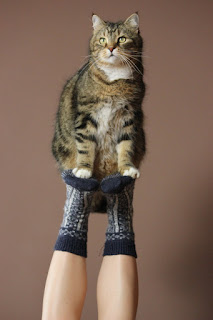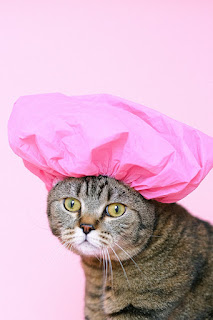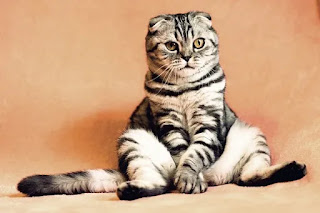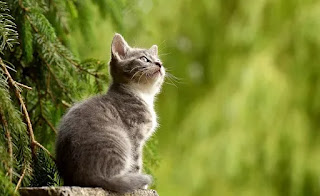Why Cat is Vomiting reasons
If you are a cat breeder, then you definitely saw vomiting in your cats several times and in several situations, and it may have passed without any problem because the cats returned to normal after that.
Vomiting in cats may be due to a minor symptom and does not need much treatment. If the cat eats quickly, it may develop vomiting or "vomiting", and cats may vomit for more serious reasons.
What is the cause of vomiting in general ?
Vomiting or "vomiting" or "vomiting" is caused by any foreign body that stimulates the stomach or anything that hinders stomach contents from moving into the gut.
This reflux occurs in which the stomach contents move back into the esophagus and mouth and the cat is forced to vomit.
If your cat is eating normally after vomiting, and she does not suffer from any problems in vomiting, or if you do not notice the presence of diarrhea, then the vomiting is most likely not due to a serious illness.
Usually, the cats vomiting or reflux of the cats to the contents of the stomach occurs due to eating something uncomfortable for his stomach, or because he played games immediately after eating a meal.
There are also some things that may be considered among the causes of vomiting in cats, such as :
A bacterial infection in the cat's gut may cause vomiting or vomiting.
Swallowing a foreign object inside the cat’s stomach, such as small toys or such as hairballs. Learn more about hairballs in cats
Intestinal parasites such as worms ... Learn more about treating cat worms and ways to prevent them
Acute renal failure.
Acute liver failure or gallbladder infections.
pancreatitis.
Post-operative nausea.
Some viral infections.
Toxins and chemicals.
Side effects of some types of medicines.
What are the steps to treat recurring cats at home ?
If you notice that your cat has vomited, you can treat it at home, but one important condition is that there are no traces of blood in the vomiting, or that there are no foreign bodies in the vomiting.
If your cat vomits accidentally, do the following :
Examine your cat's jaw and gums and make sure that they are natural and not pale in color. The temperature of the jaw can also be examined and make sure that the gums are not cold.
Know your cat's temperature, and make sure that it does not suffer from a high temperature.
Make sure your cat does not have diarrhea with vomiting.
After that, offer your cat only water, and withhold food for 12 hours.
If the vomiting stops, offer her a teaspoon of her favorite food.
If the cat does not rewind again after introducing a teaspoon of food to it, give it another spoon after 4 hours for 24 hours at the same rate.
Continue to monitor your cat. If vomiting does not reappear, you can feed it a little more.
If vomiting continues, or blood appears in the cat's vomiting, or diarrhea also appears, however, this means that the cat has persistent vomiting and needs to go to the veterinarian for an examination.
What is the reason for cats vomiting continuously :
If you notice that your cat vomits once or twice a month, this is a normal rate and does not cause great concern as cats vomit sometimes for non-serious accidental reasons.
But if you notice persistent vomiting in cats, this may indicate a serious infection in cats.
Therefore, if you notice that your cat is constantly vomiting in a short period, whether on a daily basis or from two to three times a week, you should consult your veterinarian to make sure that it does not become seriously ill.
Not eating the cats for a while causes the cats to have white foam.
Some of the causes of persistent vomiting in cats may be as follows :
Colon infections.
Stomach infections.
Pancreatitis.
Hiatus hernia.
Allergy to some types of food.
Peptic ulcers.
Heartworm infection in cats.
Bowel obstruction.
Neurological disorders.
Internal parasites such as worms.
Severe constipation.
Poisoning by some substances such as lead.
Tumors of the stomach and intestine.
How are the causes of vomiting in cats diagnosed ?
The causes of continuous regurgitation in cats are different and many, so it is difficult to determine the cause directly without taking into account several factors, indicators and symptoms that help diagnose the true cause of the disease.
Notice are these symptoms associated with the vomiting process in your cat ?
diarrhea.
Drought.
Permanent lethargy.
Blood in the vomit.
Weight loss.
Anorexia.
Frequent drinking of water.
If these symptoms appear with vomiting in your cat, you may need some other tests at the veterinary clinic to find the cause of the vomiting.
How does a veterinarian treat vomiting ?
Because of the many causes of vomiting in cats, treatment varies from one cause to another.
The vet will examine your cat and determine the cause of the problem and then begin to suggest treatment.
Sometimes the veterinarian may need to do some tests, such as a blood test, or a vomiting test to find a cause.
It may also be requested to do a television X-ray in deteriorating cases.
But in general, most of the causes of vomiting are simple if you visit the veterinary clinic early, as quick action prevents the exacerbation of any diseases.
We also do not recommend human medication to treat cat vomiting, as this may sometimes worsen their condition.
Why do cats return white foam ?
If you ask any cat breeder after a year or two in raising a cat about a common problem they have encountered, they will tell you that they return the cats white foam similar to soap or foam.
Cats reflux of white matter has more than one cause, the most important of which is stomach acid.
If your cat has not eaten for a long time, stomach acids may build up and cause white foam to recur.
Also, the cats reflux white foam continuously for several months, for more serious reasons, such as :
Infection with intestinal worms
Hypothyroidism
Liver diseases
Pancreatic diseases
Why cats vomit yellow color :
The cause of cat vomiting yellow may be more different and more dangerous, depending on the severity of the yellow color in the vomit
The color of vomiting in cats is a critical factor in identifying some health problems
For example, cats' vomiting with light yellow foam may not be dangerous, and may indicate a problem with hairballs in a cat's stomach.
If cats vomit, a dark yellow color with severe lethargy, imbalance and lack of appetite in the cat, this may be an indication of kidney disease in cats
Kidney disease in cats is one of the life-threatening diseases, so do not neglect your cat if you notice the yellow foam in the cat's vomit and consult your veterinarian.
The Opinion and Experience Of One Of Our Followers :
Vomiting may be unsatisfactory or not a symptom of a disease, but the risk is constant vomiting, as pet cats lose their body fluids and breathe in the vomit to reach their lungs and develop pneumonia, or that the cat may be exposed to malnutrition, which leads to disadvantages very quickly, especially fatty liver disease . The main reason for cats vomiting is the fur balls that cats swallow. Here are some other common reasons for cats vomiting: Simply vomiting may sometimes be a result of the cat eating her food quickly, and in that case, you should feed your cat smaller meals throughout the day. Rapid changes in the cat's diet may be annoying and may cause vomiting. Make sure to change the cat’s food gradually and over several days. You can do this by mixing the old and new foods together. Food allergies or inflammatory bowel disease: In these cases, vomiting is always after the cat eats its meals several times a week, and if this happens to your cat, you must take it to the doctor immediately to monitor your cat's reception of food while diagnosing the disease. Diseases in the vital systems caused by a viral or bacterial infection or related to sugar levels due to kidney, liver or pancreatic failure, or an imbalance in the secretions of the thyroid gland, and this will cause more severe vomiting and a decrease in the cat's appetite, and ultimately cause a decrease in weight for your beloved pet. Basically, if vomiting is frequent and the cat's appetite for food decreases, you should take it immediately to the vet clinic. The cat's health can deteriorate very quickly, but it may recover quickly as well. Some types of medication, such as antibiotics and pain relievers, may upset the stomach and cause vomiting. If vomiting continues after several cases of your cat taking medication, tell the veterinarian and stop using the medication if he advises you to do so. A blockage somewhere in the digestive system, which may be caused by something as simple as a fur ball or string and may be so bad as a tumor. Parasites and worms. Ingestion of a toxic substance. Contact your cat's veterinarian if any of the following symptoms occur: 1 - vomiting occurs every few hours, or if it occurs continuously. 2- If blood is found in the cat’s vomit, the blood may be dark or coffee colored, and in this case the cat has swallowed blood. 3- If worms or other foreign objects are found in the vomit. 4- If the cat appears depressed, lazy, or unable to move, or if other symptoms such as weight loss, diarrhea, constipation or fever appear despite the cats ’temperature is higher than the temperature of humans in the normal range, then the normal temperature of cats is from 38 to 39.5 degrees Celsius. 5- If the cat appears to be losing fluids, pinch the skin behind her neck, and if the piece he is holding appears larger than usual, the skin has lost its elasticity, and this indicates that your cat has lost a lot of fluids.
Another One :
The reason may be your hair, but I doubt it, one hair can pass through without causing problems, but if the cat swallows a lot of hair, this may indicate a hairball problem that cats usually suffer from due to the location of the hairs on their tongues. The bristles are placed backward, making it difficult for anything that enters to boil out of its mouth again, and the cat ends up swallowing the hair. If the vomiting is from freshly eaten food, there may be no problem, because many cats eat their food quickly and their stomachs may not be ready to eat large quantities, so they vomit the excess food without digesting it, if this is the case that occurs with your cat, you have to find a way to limit the amount of meals If the cat eats dry pet food, you should divide it in batches the size of a cake, or you can buy feeding bowls in the form of a puzzle, my friend has one of them and his cat loves to eat from it a lot. You can also place a squeaky ball in the center of the cat's food bowl, but this may upset or frighten him and stop him from eating entirely. If the cat eats wet pet food, she may have to divide the meals into smaller portions and feed them to the cat throughout the day. The cat may be sensitive to something in the food she eats, and her stomach may not tolerate it. If she eats dry food, she may have to switch to wet food or something else, or try to feed her dry food with little protein or better quality ingredients. Beware that chicken is at the top of the cat allergens list, and if the food you feed your cat now contains chicken, it could be the cause of your cat vomiting. If vomiting continues, you should seek the help of the veterinarian to see what he will tell you, it is not necessary for you to make an appointment in the clinic, and the doctor may suggest that you do a physical examination to rule out any bumps or tumors and may ask you to measure the cat’s temperature or examine its blood in some way to ensure that it is healthy from Incurable diseases. As for hair removal solution, it is also an effective method and may help clean the cat's digestive system completely, but be sure to give it gradually to the cat so that it does not become alienated from it, and keep the solution in the refrigerator to make it easier for the cat to swallow it, I hope my answer helped you, good luck.
Read More On Cats :
Why is Cat Meowing - Why Do Cats Meow At Night










